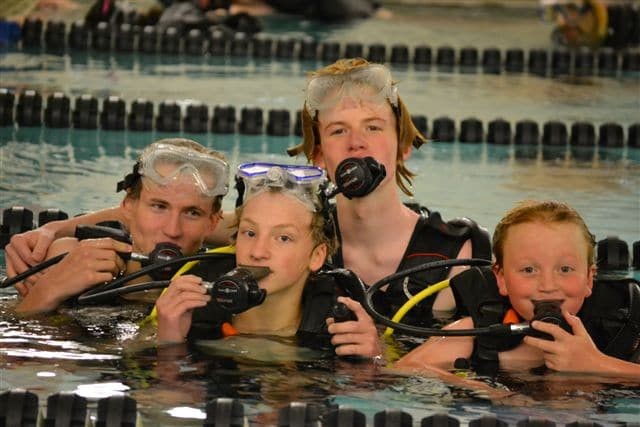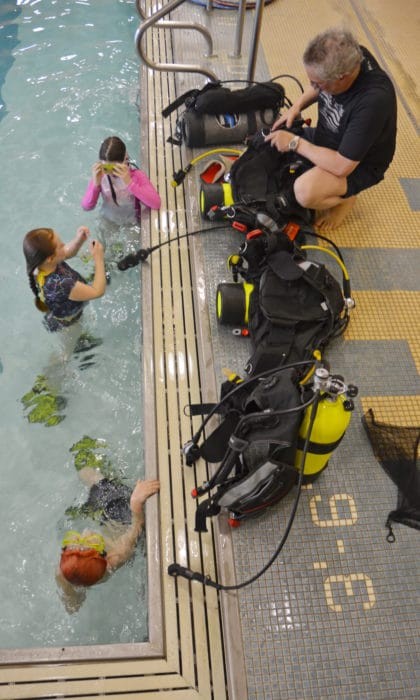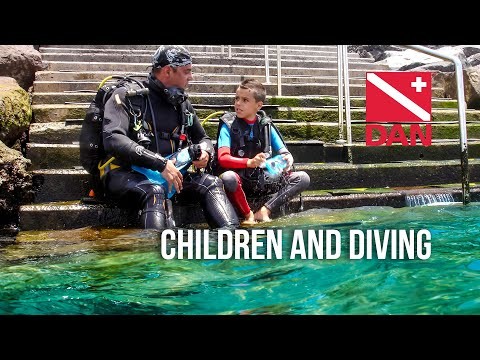In the last few decades, the face of scuba diving has changed. Gone is the mindset that diving is just for males. While that was never true, just ask the Women Divers Hall of Fame, many in the past believed it to be a high-risk macho sport. While not necessary macho, it was high risk. That concept also meant it was not suitable for children. Equipment improvements and a better understanding of risk have opened up scuba diving to most individuals subject to risk. Training has changed as well. The month-long programs have been replaced with self-study and a two or three day training period. Over time, the entry age level has dropped so now even 10-year-olds are able to scuba dive. I am all for getting new divers qualified but are 10 olds able to understand the risk and react properly? There may be other considerations as well.
I recently went on a dive boat that had just three other divers and the dive master. The other divers were a husband and wife and their 11-year-old daughter. The dive site was a reef at about 8 meters with some sand chutes about 3 meters deeper. The mother apologized for having such a shallow dive because of her daughter but it was fine with me. Watching her assemble her kit, you could tell she knew what she was doing. I found out later that between two dive vacations and some diving at home, she had over 50 dives in a year. In the water, she looked comfortable, had great trim and buoyancy and dove like an experienced diver. She dove like any mature young adult. It made me wonder, did she seem mature because she dove or was she able to dive because she was mature.

What Age To Start Scuba Diving
Many of the international accreditation agencies offer limited accreditation to children as young as 10. PADI even has pool programs for 8-year-olds. But does that mean every 10-year-old can become a scuba diver? I know some 14-year-olds, that I would never consider suggesting they learn to dive, they are just too immature and unfocused. Picking on PADI for a moment, they have a book “Children and Scuba Diving: A Resource Guide for Instructors and Parents”. Each instructor should have one as it is a part of the IDC.
In the book they say that the following questions must be considered:
- Does the child want to learn to dive? (This should not be merely the desire of his parents and friends.)
- Is the child medically fit to dive?
- Is the child comfortable in the water, and can he swim?
- Does the child have a sufficient attention span to listen to and learn from class discussions, pool and open-water briefings and debriefings and other interactions with an instructor?
- Can the child learn, remember, and apply multiple safety rules and principles?
- Are the child’s reading skills sufficient to learn from adult-level material (allowing for extra reading time, and help the child might request)?
- Can the child feel comfortable telling an unfamiliar adult (instructor or divemaster) about any discomfort or not understanding something?
I have seen many children being signed up for dive classes in dozens of resorts and there have been only a few times that I have heard a parent ask any questions other than age and can the child swim. The book says it is a reference for instructors and parents. However, I have never seen one displayed anywhere. If you are a parent (or another relative), You would have to rely on the instructor to let you know about the reference. The child and parent are supposed to watch a “Youth Risk Management” DVD. However, if you take a look at the video it highlights the general risk of diving and not really much that apply just to children or risk that are higher for children.
We see the marketing promoting teaching children to dive and the material in the DVD, but do the same risk apply to them as they do for an adult? Are there other issues that we need to be concerned with?

A Child is Not a Small Adult
I took an Early Childhood Development course once when I was considering a teaching position. The one phrase that seems to show up in every chapter of every textbook and in every lecture was “A child is not a small adult”. As a child grows they “mature” to adulthood. There are many physical and mental changes that happen, and many of these changes are happening in the 10 to 14-year-old age range. The 10-year old that gets frustrates during a football game, sits down on the field, pouts and refuses to move or play, may cause the game to halt but nothing serious has happened. Can we say the same thing if they sit on the bottom at 5 meters and refuses to do anything?
What about the adult dive buddy of a junior diver? Granted you are diving in shallow waters, however, is the adult able to be a solo diver? If something went wrong with the adult diver, can we really expect that the junior diver is able to assist? Can the adult diver take care of their own safety in an emergency and still look after the child?
I believe there are many issues that a parent needs to look at that are gloss over by all of the advertising and promotions. I do think that getting children who want to dive certified is a great plan, but not something to be taken lightly.
Developmental Concerns
I am not a doctor and do not want to say anything that could be inferred as being medical advice. There has been some doctors and other professionals, however, that have gone on record with their views. Larry “Harris” Taylor, Ph.D. is the Diving Safety Coordinator at the University of Michigan. He gave a presentation at the “Our World Underwater” convention on April 28, 2001. The title of his presentation, Why I Do NOT Train Kids, should tell you his viewpoints. In the presentation, he raises a number of concerns that parents need to consider before allowing their child to start scuba diving. His presentation and the slides are available to view and download.
Dr. David Charash did a presentation on this topic at The Science of Wound Care, Diving and Hyperbaric Medicine’s 3rd annual conference in August 2012. This conference was cosponsored by DAN. In his presentation, he discussed some common questions that he frequently answers and gives insight into the answers. These questions are:
- Can my child dive? How young is too young.
- What is the medical risk for diving in children?
- Is my child at a greater risk or lesser risk for a diving injury than an adult.
- What is the treatment injury for an injured diver?
This video is of that presentation and well worth the look if you have a child that wants to learn to become a scuba diver.
Diving is a safe sport and I would love to see more families onboard dive boats. Still, when to start a child diving is an important decision that needs to be made with a full understanding of the differences between an adult diver and a child.Diving is a safe sport and I would love to see more families onboard dive boats. Still, when to start a child diving is an important decision that needs to be made with a full understanding of the differences between an adult diver and a child.


